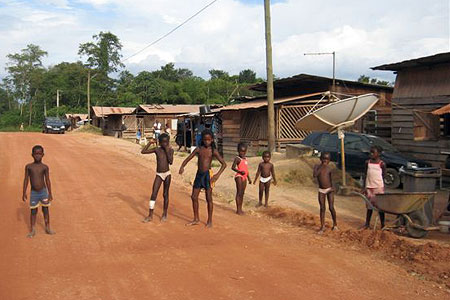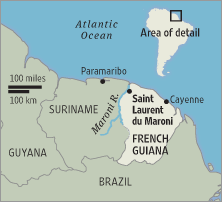| Want to send this page or a link to a friend? Click on mail at the top of this window. |
More Special Reports |
| Posted October 12, 2007 |
| French Benefits: |
| Migrants Find Help |
| South of U.S. Border |
* * * |
| Paris Doles Out Payments |
| In Latin American Turf; |
| River Guards Quit at 6 |
| By JOEL MILLMAN |
| _____________ |
SAINT-LAURENT DU MARONI, French Guiana -- A debate may be raging in the U.S. over illegal immigration, but far to the south lies a migrant mecca where jobs are plentiful, public benefits are lavish and border control practically nonexistent.
 |
| Children play in a slum -- dubbed "Jakarta" -- around housing built by the French government outside St.-Laurent Du Maroni, a town of fewer than 50,000 people. |
For newcomers like Myrlene Methelus, who fled her home in a Haitian slum nine years ago, this tiny South American territory is paradise. A generous welfare system provided her an education, free medical care and even a rent allowance and monthly stipend for herself and two small children.
The government Ms. Methelus can thank for this largess is in Paris. French Guiana, along with the Caribbean islands of Guadeloupe, Martinique and St. Martin, and a scattering of islands elsewhere around the globe, are all officially French soil. A remnant of France's once-massive colonial holdings, these territories are grouped under what the French call Les Départements d'Outre-Mer et Territoires d'Outre-Mer -- "Les Dom-Tom," for short. Citizens are every bit as French as Catherine Deneuve. And immigrants who find their way here can very quickly avail themselves of France's vaunted social-safety net.
 |
As the world's wealthy countries struggle to bolt their borders against illegal immigrants, tens of thousands of impoverished Haitians, Brazilians and Chinese have discovered this back door to France. Among the 210,000 residents of French Guiana are 42,000 migrants with permission to live there, according to a local census -- and another 30,000 or so who reside illegally.
It's not hard for newcomers to the Dom-Tom to become legal residents. And then the handouts from Paris are generous. In French Guiana, French welfare payments equal about 12% of the $3 billion gross domestic product.
For decades, steamy, green French Guiana was a dumping ground, best known for the convicts who toiled at its Devil's Island penal colony. In the 1960s, France carved a space launching port out of the jungle, and began promoting an image of a tropical France with an Amazon wilderness. Now most of French Guiana's interior is off-limits to development, while retirees shop for chic homes being built in the coastal towns.
Like thousands of other immigrants, Ms. Methelus entered French Guiana from the former Dutch colony of Suriname, crossing the sluggish brown Maroni River. The 400-mile river has just one checkpoint, manned by two officials who knock off work at 6 p.m.
Arriving here at the age of 13, Ms. Methelus was not eligible for benefits. But she was entitled to attend high school in Saint Laurent, a luxury she couldn't afford in Haiti. And learning to read and write led to a residency permit. "The prefecture gave it to me for finishing high school," she says.
 |
She gave birth to a son in Saint-Laurent's hospital in 2000, and soon after started collecting a monthly living allowance of about $210. The stipend doubled after the birth of a daughter in 2004.
Today she rents a cinder-block home in a sprawling shantytown on the edge of this river town. While she lacks amenities French would consider de rigueur, her house has electricity, a kitchen and a privy, which would be considered luxuries in the slum she left in Port-au-Prince. During some years, she has received monthly rent subsidies of $420.
Immigrants find plentiful jobs at France's minimum wage of £8, or about $11, an hour. One result: Immigrants assimilate well and haven't staged violent protests like those seen outside Paris. Local attitudes toward immigrants are benign, in part, because France, not local taxpayers, pays most of the welfare costs. Most illegals here have no plans to move to France itself.
The surge in payouts from Paris, however, has added a new dimension to the immigration debate in France. Until recently, French citizens have been focused mainly on migrants who come legally from former colonies, especially Arab nations. France and other nations in Europe have largely failed to assimilate these newcomers.
French President Nicolas Sarkozy put the issue on his campaign agenda last year with a TV-friendly motorboat ride down the Maroni. Since winning the election, he has pushed for tougher immigration rules, including one requiring that migrants speak French.
But blocking off the many varied routes to the Dom-Tom won't be easy. Fishing fleets or smugglers working out of Venezuela or Suriname drop migrants on French Guiana's coast, and ferry job seekers from around the Caribbean to the tourist hot spots of Martinique and St. Martin. Authorities estimate that 20,000 to 30,000 illegals have crossed into Guadeloupe, Martinique and St. Martin in recent years.
One of the most direct and heavily trafficked routes starts in Haiti, where travel agencies book late-night charters to Suriname's capital of Paramaribo. From there, migrants take taxis to the Maroni and hop on boats for the half-mile ride to French Guiana.
"Fifty Surinamese dollars, all day long," -- or $19 -- shouts pirogue pilot Milton Salman over the burp of his ancient outboard motor.
 |
Hundreds of these sleek canoes cross the Maroni every day. But under a treaty between France and Suriname, the river is designated "international water" and off-limits to French police.
On a recent summer night on the French side of the Maroni, several migrants came ashore, including two men, one from Brazil and the other from Guyana, the former British colony. Both clambered aboard a taxi named S'il Vous Plait and took off toward Sinnamary, a fishing port where jobs are plentiful and employers can sponsor migrant employees for legal residence.
Once migrants make it to the Dom-Tom, it's easy to stay. Until recently, local town halls in French Guiana could issue residency permits to anyone claiming to have lived here for 10 years, regardless of how they arrived. "People could show a letter from a doctor or from a neighbor that said, 'I have known this man for 10 years,' and that was enough," says Serge Garcia, France's top immigration cop in French Guiana. "People even brought us bills from stores. 'Look, I bought this radio 10 years ago.' Voilá, you can stay."
Now, mere length of residency no longer qualifies. But migrants can take advantage of France's liberal family-unification policy. Unlike the U.S., where family members of residents get priority, but still join a long waiting list for immigration visas, France easily grants legal status to the offspring, siblings and parents of legal residents. Usually, marriage to a residency-card holder is enough for new spouses to qualify for permits of their own.
Candio Berlaud, a Haitian construction worker, arrived in 1986, legally, to join his father. In 2000 he met a woman from the Dominican Republic, Sineida de los Santos, who came to French Guiana illegally through Suriname. In July 2001 they had a son. By year's end, Ms. de los Santos received her residency permit too. "The father is a resident, and the son legally was born in France," Mr. Berlaud explains, "So the mother can be a resident, too."
Under French law, babies born to illegal immigrants are legal residents who qualify for citizenship when they turn 18. Children are guaranteed free education, and are eligible for free health care, as are all Dom-Tom residents. Usually, most parents get residency permits, too.
"In theory, having a baby doesn't help you become legal here," says Gabriel Carles, a 52-year-old obstetrician from Toulouse who runs the maternity ward at Saint-Laurent's Franck Joly Hospital. "In practice, I see it every day."
In Room 8, 15-year-old Kasia Mota de Santos waits with her mother to deliver her first child. The two women arrived five months ago from Amapa, in Brazil's Eastern Amazon. Even without residency papers, the two had no problem checking into Saint-Laurent's hospital.
The women know neither will get welfare payments for the baby until the mother finds a way to stay here legally. But what matters, says the soon-to-be mother, "is that my baby be French. Brazil is good, but France is better.
Reprinted from The Wall Street Journal of Thursday, October 11, 2007.
| Wehaitians.com, the scholarly journal of democracy and human rights |
| More from wehaitians.com |